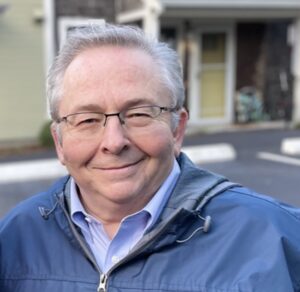Mark Forest, a Democrat running for his second four-year term on the Barnstable County Commission, is no stranger to Cape Cod politics. He was district director for U.S. Rep. Gerry Studds and chief of staff for his successor, U.S. Rep. Bill Delahunt. He has been acting town manager in both Provincetown and Brewster, and he was elected to Yarmouth’s select board in 2017.

He doesn’t want to rest on his laurels, he says: “The Cape is a special part of the world, and I’m going to do whatever I can to continue to make it special.”
Forest was born in Brockton, went to UMass Boston, and taught as a VISTA volunteer in Boston’s public schools in the 1970s. He graduated from the master of public administration program at Suffolk University in 1981 and took a job in Provincetown Town Hall as funding coordinator, securing state and federal money for town projects.
Forest co-founded the Lower Cape Community Development Partnership, and after a stint as acting town manager in 1984 moved on to work for Studds. Serving in Provincetown during the AIDS epidemic showed him how a responsive local government can help people even when federal and state support is lacking, he says.
Forest ran for county commissioner in 2016 in an election where two seats were open and three people were running. Republican Ronald Beaty Jr. edged out Forest for the second seat by 903 votes.
Voter confusion over the “pick two” contest almost certainly played a role in that race; about 23,000 Democratic voters did not vote for two candidates.
In his next campaign in 2020, Forest adapted. Democratic town committees on the Lower and Outer Cape raised funds to place him and Democrat Sheila Lyons on the same campaign signs, he said, with a reminder to “Vote for Two.”
The strategy paid off. Both Forest and Lyons were elected that year, with each getting at least 12,000 more votes than Beaty.
Forest says that wastewater has been a key priority in his time on the commission. The county helped create the AquiFund, which offers residents low-interest loans to upgrade septic systems or connect to municipal sewers.
He opposed the National Guard’s proposed machine gun training range at Joint Base Cape Cod, which Forest says could threaten the Sagamore lens of Cape Cod’s aquifer. Gov. Maura Healey halted the machine gun range project last month.
“I think that’s a recognition of how fragile our water resources are,” says Forest. “We need to protect the whole sole-source aquifer.”
Forest says he supports renewable energy but faults the federal government on its efforts to keep local governments informed.
“The state and federal governments have done a less-than-adequate job in the overall planning of transmission for the cables,” Forest says, adding that fishermen and other stakeholders must have a voice in decision-making for offshore wind farms.
“We need to deal with climate change — but there are ways to do these projects while also addressing some of the concerns that are being raised,” he says.
Forest says the county has played an important role in securing funding for vital infrastructure, including the replacement of the Sagamore Bridge and the expansion of broadband. The county has earmarked leftover American Rescue Plan Act funds for affordable housing initiatives, including in Truro and Orleans, he says.
Forest does not support ballot Question #6, which would grant more authority over spending to the county’s 15-member assembly of delegates, arguing that it would complicate the county’s budget and financial management processes.
“It would be like, in Wellfleet, having multiple town meetings to appropriate funds,” he says. “We should work within one budget.”
Forest says he is proud of the county’s financial management, including the AA+ bond rating awarded in August, which reduces borrowing costs. “That’s a huge accomplishment from where we were four years ago,” he says, adding that the county aims to secure a AAA bond rating within the next two years.
Looking ahead, Forest says the Cape’s biggest challenges remain affordable housing, broadband access, transportation infrastructure, and coastal water quality. He also is looking forward to the development of a master plan for Joint Base Cape Cod, which will involve collaboration between the county, the Mass. National Guard, and the Cape Cod Commission.
The three current commissioners have worked together well on these efforts, he says.
